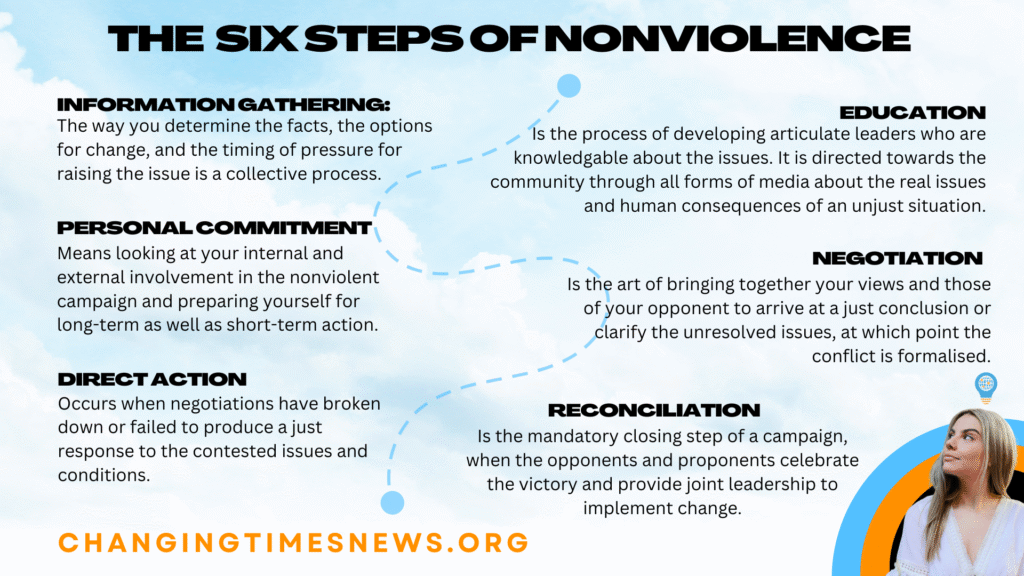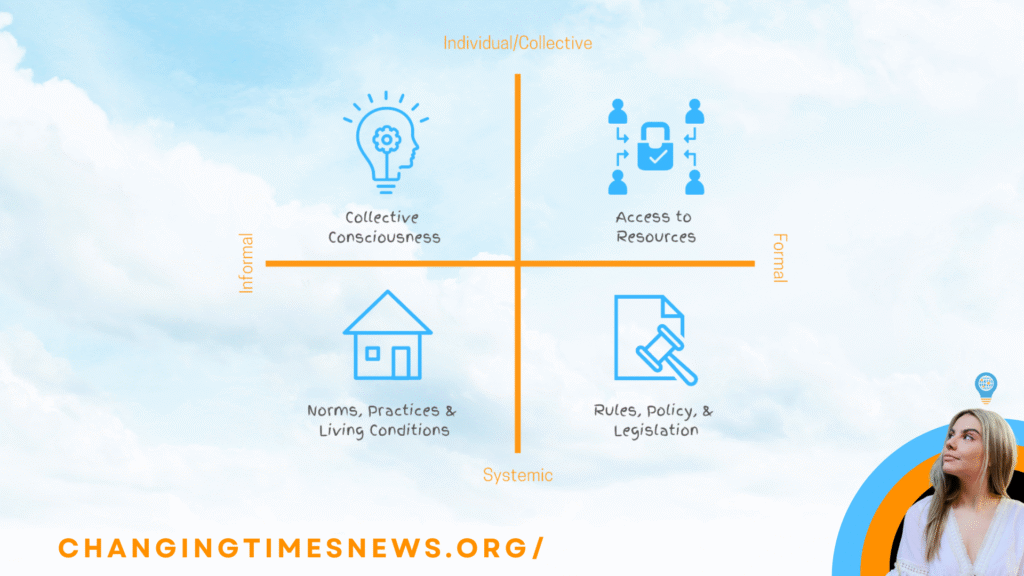In a world rife with division, anger, and systemic injustice, the philosophy of Martin Luther King Jr. offers a timeless framework for social change grounded in both morality and strategy. In this week’s Changemaker Q&A episode, we hear how King’s nonviolent philosophy—deeply influenced by his Christian faith and by Mahatma Gandhi—can still guide activists today, not as an idealistic dream, but as a lived practice.
Below, we explore the six tenets of Kingian nonviolence, the six practical steps for applying it, and what all of this can look like in today’s activism.
What Nonviolence Meant for King
Central to King’s approach are two intertwined ideas:
- Moral ends require moral means — Justice must not be pursued by unjust methods. Echoing both Christian doctrine and Gandhian thought, King held that the way change is made shapes the change itself.
- Loving your oppressor — This doesn’t mean tolerating wrongdoing without resistance, but refusing hatred, separating the person from the oppressive acts they commit, and maintaining the belief that people (even those we profoundly disagree with) can change.
King saw nonviolence not as passive or weak, but as courageous, strategic, and transformative.
Listen from 40:30 – 48:48
King’s Six Tenets of Nonviolence
Based on King’s first book Stride Toward Freedom and other writings, these six principles form the ideological backbone of his philosophy. Foundation for Economic Education+2nmmlksc.org+2
| Tenet | What It Means |
|---|---|
| 1. Nonviolence is a way of life for courageous people. | Nonviolence demands spiritual, emotional, and intellectual strength. It’s not a tactic you adopt only in certain moments. |
| 2. Nonviolence seeks to win friendship and understanding. | The goal is reconciliation, not defeating an opponent; to build the “Beloved Community.” |
| 3. Nonviolence seeks to defeat injustice, not people. | Critique systems, structures, ideas—not the persons; understand they may be influenced by those systems. |
| 4. Nonviolence holds that suffering can educate and transform. | Voluntary suffering without retaliation can illuminate injustice—both to the oppressor and the broader society. |
| 5. Nonviolence chooses love instead of hate. | Love is active, creative, and unselfish. It means resisting internal hatred, bitterness, or vindictiveness. |
| 6. Nonviolence believes that the universe is on the side of justice. | A steadfast hope that justice will prevail even if the path is long and difficult. |
Six Steps of Nonviolent Social Change
King’s principles guide attitude and direction. But the episode also reminds us of a more tactical framework—often referred to as the six steps of nonviolent change—that help translate philosophy into action. These steps are drawn from King’s work and elaborated by his colleagues. The King Center+2glastonburymlkci.org+2
- Information gathering — Understand the roots, systems, beliefs around the issue. Know your own position and your opponent’s position.
- Education — Share the reality widely. Build awareness, not just among those already sympathetic.
- Personal commitment — Embody the principles. Prepare mentally, spiritually and morally for hardship.
- Negotiation — Attempt dialogue and compromise when possible, seeking justice via relational means.
- Direct action — When negotiation fails, nonviolent direct action—civil disobedience, protests, demonstrations—seek to create moral tension and force engagement.
- Reconciliation — Working toward healing and lasting solutions post-conflict; maintaining the humanity of all involved; building trust.

Applying King’s Philosophy Today
What does all this look like in practice in the social change space now? From the podcast, several applications stand out:
- Grounding activism in love and hope rather than in anger or hatred. As the host described, separating individuals from the harmful beliefs or actions they hold—even imagining them as a child—can help maintain empathy and resist dehumanisation.
- Focusing on systems over individuals. Direct action should address oppressive structures rather than merely attacking personalities.
- Being prepared for suffering without retaliation — acknowledging that sacrifice, discomfort, and patience are part of the process.
- Building bridges with people who disagree — not necessarily to agree, but to understand and find common ground, recognizing potential allies in adversaries.
- Sustaining hope. Even when progress seems slow, King’s belief that “the universe is on the side of justice” offers a lodestar: to keep going even without immediate wins.
Why It Matters
In many activism narratives—especially in mass media—the tension between “violent vs nonviolent” often gets flattened into a binary. But King’s philosophy argues for something richer: that how we pursue change shapes what change emerges. Methods matter not just tactically, but morally.
When nonviolence is truly practiced:
- Movements gain legitimacy, especially in the eyes of people who might otherwise be neutral or leaning toward the status quo.
- Injustice is exposed more clearly because contrast between oppression and compassionate resistance becomes stark.
- Relationships are preserved, allowing post-conflict healing; avoiding cycles of retaliation.
Challenges & Reflection
The episode doesn’t shy away from the discomfort in embracing some aspects—especially suffering without retaliation, or loving oppressors. These go against many instincts shaped by an often adversarial world. It takes conscious, ongoing work.
As the host reflects, this isn’t a one-time epiphany but something that requires daily effort: reminding oneself that hate or anger, even if understandable, may undermine the change one hopes to see.
Martin Luther King Jr.’s nonviolent philosophy isn’t quaint or passive. It’s demanding. It asks us not only to act for justice—but to carry ourselves in ways which honor justice every step of the way. It asks courage, patience, and love.
As activists, changemakers, observers—or anyone who cares about justice—King gives us tools: a moral compass (the principles), and a roadmap (the steps). Putting them into practice consistently isn’t easy. But in an era where polarization is high and the risk of tit-for-tat retaliation is constant, these ideas may be more relevant than ever.


